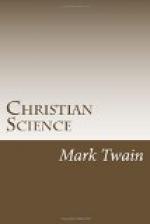This veto power could some time or other have a large value for her, therefore she was wise to reserve it.
It is likely that it is not frequently used. It is also probable that the difficulties attendant upon getting admission to membership have been instituted more to invite than to deter, more to enhance the value of membership and make people long for it than to make it really difficult to get. I think so, because the Mother. Church has many thousands of members more than its building can accommodate.
AND SOME ENGLISH REQUIRED
Mrs. Eddy is very particular as regards one detail curiously so, for her, all things considered. The Church Readers must be “good English scholars”; they must be “thorough English scholars.”
She is thus sensitive about the English of her subordinates for cause, possibly. In her chapter defining the duties of the Clerk there is an indication that she harbors resentful memories of an occasion when the hazy quality of her own English made unforeseen and mortifying trouble:
“Understanding Communications. Sec. 2. If the Clerk of this Church shall receive a communication from the Pastor Emeritus which he does not fully understand, he shall inform her of this fact before presenting it to the Church, and obtain a clear understanding of the matter—then act in accordance therewith.”
She should have waited to calm down, then, but instead she added this, which lacks sugar:
“Failing to adhere to this By-law, the Clerk must resign.”
I wish I could see that communication that broke the camel’s back. It was probably the one beginning: “What plague spot or bacilli were gnawing at the heart of this metropolis and bringing it on bended knee?” and I think it likely that the kindly disposed Clerk tried to translate it into English and lost his mind and had to go to the hospital. That Bylaw was not the offspring of a forecast, an intuition, it was certainly born of a sorrowful experience. Its temper gives the fact away.
The little book of By-laws has manifestly been tinkered by one of Mrs. Eddy’s “thorough English scholars,” for in the majority of cases its meanings are clear. The book is not even marred by Mrs. Eddy’s peculiar specialty—lumbering clumsinesses of speech. I believe the salaried polisher has weeded them all out but one. In one place, after referring to Science and Health, Mrs. Eddy goes on to say “the Bible and the above-named book, with other works by the same author,” etc.
It is an unfortunate sentence, for it could mislead a hasty or careless reader for a moment. Mrs. Eddy framed it—it is her very own—it bears her trade-mark. “The Bible and Science and Health, with other works by the same author,” could have come from no literary vacuum but the one which produced the remark (in the Autobiography): “I remember reading, in my childhood, certain manuscripts containing Scriptural Sonnets, besides other verses and enigmas.”




